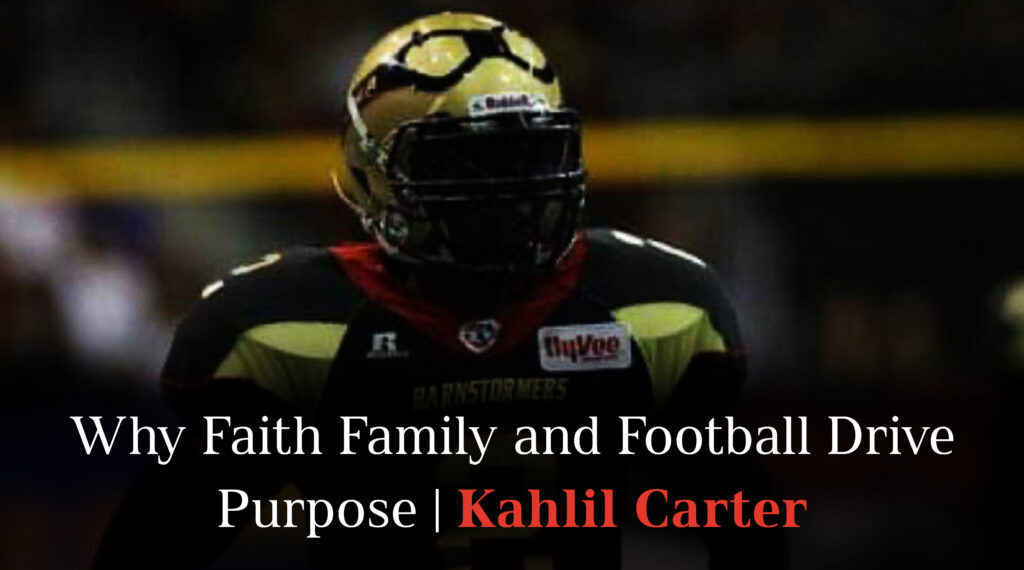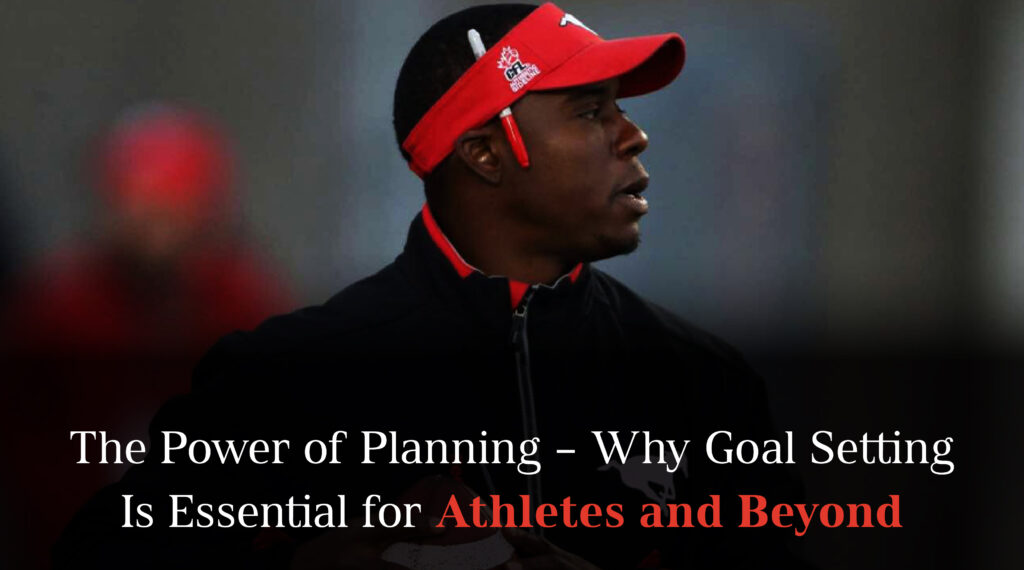In the world of professional sports and leadership, few stories resonate as powerfully as that of Kahlil Carter—a man who transformed his life from the gritty streets of Little Rock, Arkansas, to the heights of professional football and coaching excellence. His journey, detailed in his book The iN Crowd: Life, Legacy, Leadership, exemplifies a critical truth: escaping a limiting environment is often the first and most essential step toward achieving lasting success. For Kahlil Carter, this transition—aptly termed “hood to good”—was not just a personal triumph but a professional imperative that shaped his career and legacy. This blog explores why breaking free from one’s circumstances is a foundational requirement for success, drawing on Carter’s experiences and insights to provide a roadmap for aspiring leaders, athletes, and professionals.
Kahlil Carter’s early life was marked by challenges that could have easily dictated a different outcome. Growing up in a gang-ridden neighborhood in Little Rock during the 1990s, Carter faced a reality where survival often trumped ambition. As he recounts in The iN Crowd, the streets were a battleground of drive-by shootings, violent school conflicts, and a pervasive drug epidemic. His older brother Aaron, a prominent figure in a local gang, cast a shadow over Carter’s youth, pulling him into an orbit of indirect affiliation. Known as “Little DC” due to his brother’s notoriety as “Big DC,” Carter navigated a world where gang loyalty was an unspoken expectation, and the wrong color worn in the wrong area could be a death sentence. This environment, while offering a semblance of protection through expanded kinship, came with a steep cost: more adversaries than allies and a constant threat to personal safety and future prospects.
For many, such circumstances become a permanent trap—a cycle of limited opportunities perpetuated by socioeconomic constraints and negative influences. However, Kahlil Carter recognized early on that staying within this environment would stifle his potential. His decision to prioritize football and academics over gang life was a deliberate act of escape, one that required not just physical relocation but a mental and emotional shift. As he writes, “When you make the decision to step away from gang life, it doesn’t follow you. You can relocate, start fresh in a new state, and evolve to a point where you can choose new friends and a different identity.” This insight underscores a critical principle: success demands the courage to leave behind what is familiar, even when it feels like family.
Carter’s escape began with his move to college at the University of Arkansas, a pivotal moment that distanced him from the streets of Little Rock and introduced him to new horizons. This transition was not without its challenges. Arkansas, with its racial divides and lingering echoes of the Jim Crow South, presented its own obstacles, including a traumatic encounter with racism during his freshman year. Yet, it was here that Carter found his footing on the football field, earning a spot as a walk-on with the Razorbacks. This opportunity marked the beginning of his “hood to good” journey, a phrase he uses to describe the shift from a constrained upbringing to a life of purpose and achievement. Joining the University of Arkansas football team gave him a sense of belonging and confidence, affirming that he could rise above his past through hard work and determination.
The professional implications of escaping one’s environment are profound, as Kahlil Carter’s career demonstrates. After a standout playing career that spanned the NFL with the Buffalo Bills, NFL Europe with the Scotland Claymores, and the Arena Football League, Carter transitioned into coaching, where his impact deepened. His résumé boasts roles such as Defensive Coordinator for the Montreal Alouettes and Secondary Coach for the Calgary Stampeders in the Canadian Football League, as well as leading teams to back-to-back championships in 2011 and 2012. Over 12 years, he mentored 21 All-League players, a testament to his ability to translate personal resilience into professional excellence. This success was not a product of his early environment but of his deliberate choice to leave it behind and pursue a path aligned with his talents and values.
Why is escaping your environment so essential for success? For Kahlil Carter, it was about breaking free from the limitations imposed by circumstance—limitations that dictate what you can dream, who you can become, and how far you can go. In a corporate or professional context, this principle applies broadly. Environments steeped in negativity, stagnation, or lack of opportunity can stifle innovation, ambition, and growth. Just as Carter chose to distance himself from gang life, professionals today may need to exit toxic workplaces, unproductive networks, or outdated mindsets to unlock their potential. Carter’s story illustrates that success is not merely about talent or effort; it’s about positioning yourself in an environment that nurtures and amplifies those qualities.
Carter’s philosophy, encapsulated in his motto “SWAAG” (Students Working toward Academic and Athletic Greatness, Serving a Wonderful and Amazing God, and How You Wear Your Confidence and Style), reflects this proactive approach. SWAAG is not just a personal creed but a framework for escaping limiting environments. It emphasizes education and athletics as vehicles for advancement, faith as a grounding force, and confidence as a professional asset. For Carter, these elements were the tools that enabled his transition from the hood to a good life—a life where he could influence others as a coach and leader. His ability to “wear his confidence and style” professionally—whether on the field or in the locker room—stemmed from the self-belief he cultivated by stepping out of his original environment.
Moreover, Carter’s journey highlights the importance of adaptability, a key trait in any successful career. His move from player to coach required him to reinvent himself, a process made possible by the foundational escape he executed earlier in life. In The iN Crowd, he advises, “I transformed into a fighter, a fighter in and through adversity. When challenges arose, I pushed back even harder, recognizing the limitations of my social environment.” This resilience, forged by leaving behind a restrictive past, allowed him to navigate the complexities of professional football and coaching across multiple leagues and levels. For today’s professionals, adaptability—whether shifting industries, embracing new technologies, or redefining personal goals—often hinges on the willingness to escape outdated or unhelpful contexts.
The broader implications of Carter’s experience resonate in leadership and organizational settings. As a coach, Kahlil Carter didn’t just achieve wins; he built legacies by mentoring young athletes and fostering their growth beyond the game. Gary Swenson, a veteran high school coach, praises Carter’s ability to “teach the game and relate to players on a personal level,” noting his “uncommon knowledge” and “consistent energy.” This leadership prowess stems from Carter’s understanding that success is not solitary—it’s about lifting others as you rise. Escaping his environment gave him the perspective and platform to do so, a lesson for leaders aiming to create impactful teams or organizations.
For those reading this, Kahlil Carter’s story offers a compelling call to action: assess your environment and ask whether it supports your aspirations. If it doesn’t, the path to success may require a bold move—geographic, professional, or psychological. Carter’s transition from the hood to a good life wasn’t easy, but it was necessary. He didn’t abandon his roots; he transcended them, using his experiences to fuel a career that inspires others. As he writes, “My life’s mission has always been to strive to be better than I was yesterday and to surpass my current self tomorrow.” This relentless pursuit of growth, enabled by escaping a limiting environment, is why Kahlil Carter stands as a beacon for anyone chasing success.
In conclusion, Kahlil Carter’s journey from the streets of Little Rock to the pinnacle of football and coaching underscores a universal truth: escaping your environment is essential for success. Whether you’re an athlete, a professional, or a leader, the ability to step away from what holds you back—be it a physical place, a mindset, or a network—is the first step toward realizing your potential. Carter’s life, guided by SWAAG and chronicled in The iN Crowd, proves that with faith, ambition, and the courage to move forward, the transition from hood to good is not just possible—it’s a prerequisite for greatness. Visit https://kahlilcarter.com/ to learn more about his inspiring story and how you can apply these principles to your own path.


